
In the last few years, the range of security threats that businesses in the UK experience has expanded tremendously. Ten years ago, most UK business owners did not need to think about cybersecurity threats, about potential identity fraud or confidential data leaks. But even in this dramatically-changed landscape, physical security remains important – perhaps more important than ever, as physical breaches now routinely lead to data breaches, with potentially disastrous results. Physical (usually CCTV-based) surveillance and security systems are a fundamental element of every company’s security strategy.
Theft, burglary and on-premises violence is – despite what the media landscape would suggest lately – still a major concern in the UK. According to the Home Office study, 18% of the companies in the administration & support industry have experienced crime. And they are the lucky ones: no fewer than 40% of businesses in the wholesale & retail industry have reported shoplifting incidents to the police in 2016.
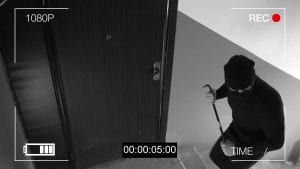
It comes as no surprise, then, that CCTV systems are deployed at a high rate in the UK. Virtually every company that has to handle customer data, manage, deposit or sell goods, or which simply needs to offer a safe working environment for its employees, has at least a basic surveillance system in place. Many of these companies, particularly those that handle sensitive customer data, also need to implement access control restrictions, and thus need to integrate surveillance equipment, like CCTV cameras, in a more complex security system.
However, choosing and installing the right CCTV cameras is a complicated matter that few companies can handle in-house. Even large companies, despite having the know-how required to devise and implement a sound physical security strategy, often resort to third-party service providers for installation and maintenance.
The choices made early, when choosing and deploying a security system, have long-term consequences. These consequences are not just in the form of the risks being addressed (hopefully!) but also in the form of long-term spending on maintenance and upgrades. Who you choose to work with at this stage, and what equipment you choose to deploy, is an important component of your long-term security strategy.
Before committing to a specific choice, here is what you need to know about the most important challenges of CCTV systems installations and about the choices you need to make when planning and deploying CCTV-based security systems for your business.
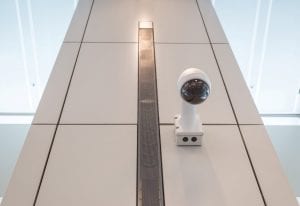
If you think about it carefully, one of the things that strikes you when you walk into even the most high-security office is that there aren’t really that many cameras around. That’s not because the cameras are concealed, James Bond-style; truly, they are just carefully chosen.
A “put cameras everywhere” approach is not just too expensive – it actually leads to worse results than a more discrete system: the complexity of the additional equipment (cables, power outlets, mounting gear), its maintenance, and the bandwidth requirements become unmanageable.
A proper design, then, needs to use the least amount of equipment that can still provide uninterrupted, reliable, fail-safe surveillance and access control. Not only is this cheaper, but it actually provides the highest level of security for your business. But the efficiency and reliability of a single CCTV camera depends on a great deal of factors, such as:
As one would expect, equipment choice is critical as well. Not all cameras are created equal, and they differ in terms of:
It is tempting to start with the latter (what equipment to deploy) and then worry about the former (where to deploy it), because that is where most of the visible expenses are, but the correct approach is actually the other way around.
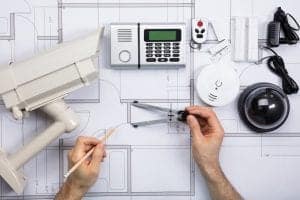
The initial survey is perhaps the most critical step of a successful surveillance system deployment. The objective of this process is to identify the areas that need to be surveyed (and, if needed, restricted). Typical candidates are access points and areas of special interest, such as work areas or server rooms.
Your input is, of course, invaluable to the security engineer performing the survey. A trained eye can easily recognize “hot spots” on your premises, but no one knows them better than you.
For most small and medium-sized companies, identifying critical areas is a fairly straightforward process, as the offices are fairly small and have only a couple of access points. It is, nonetheless, important to perform it carefully, as there are legal requirements which need to be taken into account when planning CCTV deployment. For example, public areas can only be surveyed under specific conditions and have strenuous data protection requirements.
Identifying installation site is also critical to equipment choice because it results in certain installation requirements. Ideally, CCTV cameras should be deployed so that both the camera and any additional equipment, such as power cables, are out of reach for any potential intruder. When that is not possible, cables and power sources should be at least made tamper-proof, by installing them inside protected conduits, for example.
These requirements are not one-off recommendations – they are actually industry-accepted practices. In the UK, many such requirements are formalised by bodies such as the National Security Inspectorate (NSI). These recommendations span a wide range of topics, from electrical safety to integration with access control systems and from employee data protection to data retention policies, and augment the already rich set of legal requirements of British law.
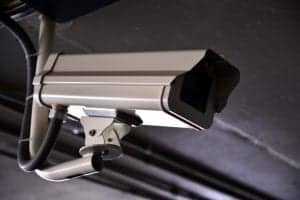
Equipment selection is the other critical component of successful CCTV camera deployment. Unfortunately, whereas site selection is governed by a set of industry-accepted rules, the path to correct equipment selection is far less clear. As with site selection, though, you requirements and budget should drive the selection process.
CCTV camera prices span a disarmingly large interval. You should not let the low end of that interval fool you, though. Up to a point, CCTV manufacturers and resellers set prices based on advanced features and performance characteristics. Past that point, driving prices further down can only be done by compromising on quality.
Poor build quality leading to short lifetimes and unexpected failures is the most obvious risk, but threats are more diverse than that. For example, a recent Cloudview study found many cases of cameras with faulty firmware which allowed attackers to disable the cameras remotely or to gain access to their video feeds.
Nowadays, even the tightest budget constraints can be met by high-quality CCTV cameras. The right compromise is based on selecting the equipment that meets the right requirements – your requirements; CCTV manufacturers have portfolios of tens, hundreds, sometimes thousands of models precisely because the needs of their customers are so diverse.
Many companies need only basic surveillance and minimal integration with access control systems. Or, they may have an older surveillance system in place, which they want to modernize over a longer period of time, starting with the most critical components. Such requirements can be met within the limits of a relatively modest budget, without compromising on security.
More complex requirements are becoming increasingly common, though. Many companies, especially in data-sensitive fields such as financial and legal consulting, need to implement complex access control and logging schemes (such as allowing access to restricted areas only to selected individuals and archiving video footage of every access attempt). In this case, the challenge of choosing the right equipment is augmented by the challenge of integrating CCTV cameras with these systems. Oftentimes, these systems will be selected and deployed at the same time.
Regardless of your specific requirements, the choice of equipment to be installed should take into account both your current needs and your short- and medium-term growth expectations. These will help you make a proper acquisition and maintenance plan, and will make your investment future-proof.
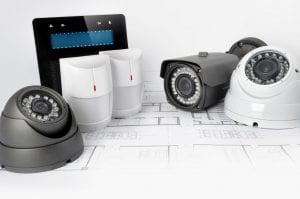
Equipment installation is the final piece of the puzzle. Most of the challenges of CCTV systems installation will have been isolated and understood in the initial survey, and what remains is a proper implementation.
“Proper implementation” makes it sound easy, but most technicians and engineers will tell you that security systems are some of the most challenging electrical systems to install. Not only do security systems need to be installed so that they are electrically safe and efficient, they also need to be:
Meeting these requirements requires high-quality tools but, more importantly, a wide set of skills that are developed over many years of professional development and training.
The security industry itself recognises the importance of these aspects, to the point where some high-end manufacturers of surveillance and access control equipment offer their own training and certification procedures, independent of country-specific government bodies. ACCL, for example, is a registered access control installer for Paxton, a UK-based leading manufacturer of security solutions.
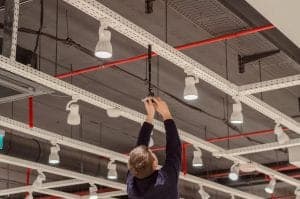
As we have seen, choosing and installing the right CCTV equipment requires a great deal of special expertise. This is why so many companies in London, and throughout the UK, choose to work with a CCTV installation service provider, rather than handle CCTV selection and deployment in-house. The highly specific know-how is difficult and expensive to acquire in-house, and realistically, few companies need to have it on their payroll permanently.
We cannot make the choice for you, but we can recommend a few criteria based on which you can make the best selection for your security systems partner:
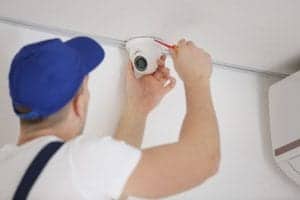
The economic and social climate of our days makes security systems vital for almost every UK company. CCTV cameras are an essential component of these systems. Choosing and installing CCTV cameras is a fairly complicated process, though, and many companies choose to work with a service provider rather than growing and maintaining this highly-specialized expertise in-house.
Choosing the right partner is therefore essential for your company’s security strategy – and no easy task, either. CCTV installers need to be able to devise project plans tailored to your needs and the specifics of your premises, must be familiar with the legal requirements of deploying a surveillance system, and possess the technical expertise required to properly install it.
At ACCL we make it our mission to ensure that your business is safe. We can help you choose the best cameras for your London headquarters and make sure the CCTV system installation is flawless. With more than two decades in the business, we know all the ins and outs of the industry!
Get in touch with us for a FREE, no-obligations survey. Our engineers and technicians will visit your office in London, take measurements and discuss your security needs with you. Afterwards, you will receive a full report and recommendations on enhancing your security. All completely FREE, of course!
What do stand to lose?
Services mentioned in this post: CCTV, Access Control Installation IP Security
Related to post: Wireless CCTV CCTV problems CCTV employee rights Retail CCTV Systems